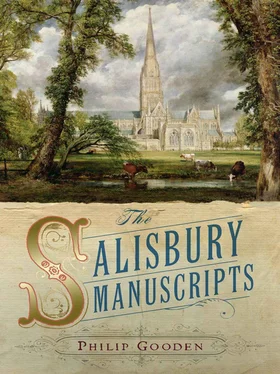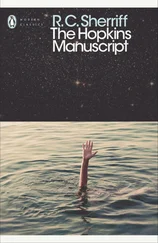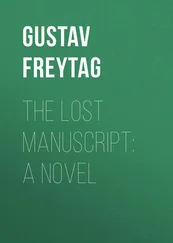Philip Gooden - The Salisbury Manuscript
Здесь есть возможность читать онлайн «Philip Gooden - The Salisbury Manuscript» весь текст электронной книги совершенно бесплатно (целиком полную версию без сокращений). В некоторых случаях можно слушать аудио, скачать через торрент в формате fb2 и присутствует краткое содержание. Год выпуска: 2009, Издательство: Soho Press, Жанр: Исторический детектив, на английском языке. Описание произведения, (предисловие) а так же отзывы посетителей доступны на портале библиотеки ЛибКат.
- Название:The Salisbury Manuscript
- Автор:
- Издательство:Soho Press
- Жанр:
- Год:2009
- ISBN:нет данных
- Рейтинг книги:3 / 5. Голосов: 1
-
Избранное:Добавить в избранное
- Отзывы:
-
Ваша оценка:
- 60
- 1
- 2
- 3
- 4
- 5
The Salisbury Manuscript: краткое содержание, описание и аннотация
Предлагаем к чтению аннотацию, описание, краткое содержание или предисловие (зависит от того, что написал сам автор книги «The Salisbury Manuscript»). Если вы не нашли необходимую информацию о книге — напишите в комментариях, мы постараемся отыскать её.
The Salisbury Manuscript — читать онлайн бесплатно полную книгу (весь текст) целиком
Ниже представлен текст книги, разбитый по страницам. Система сохранения места последней прочитанной страницы, позволяет с удобством читать онлайн бесплатно книгу «The Salisbury Manuscript», без необходимости каждый раз заново искать на чём Вы остановились. Поставьте закладку, и сможете в любой момент перейти на страницу, на которой закончили чтение.
Интервал:
Закладка:
Tom glanced up at Felix Slater but the cleric appeared to be wholly absorbed in his work. Tom wondered what he was writing. For sure, the Canon’s words must be more respectable than what was recounted in his father’s neat hand. Tom still felt hot and — though it was ridiculous — guilty for what he was reading. He took one more dip into the book but on this occasion found nothing more dramatic than a description of a morning’s hunting on the Downton estate.
By this time Slater had come to the end. He concluded in the same way, grinding the nib of the pen into the paper. He blotted what he’d written and put the sheet to one side.
‘Well, Mr Ansell, you have seen enough, I dare say.’
‘It is an interesting volume.’
‘That is one word for it, though not the word I should have chosen. My dilemma is that I cannot now do away with this record of my father’s even if I wish it had never been found or that he had never written it. Or, rather, I might wish that parts of his life had not been so very rackety . The volume you are holding might, I suppose, have a historical value one day.’
As Slater said this, his eyes flicked towards the cases containing the primitive artefacts. Tom realized that whatever the man’s feelings about his father — unease, embarrassment, even anger or disgust — he could not bring himself to destroy what George Slater had committed to paper. The Canon had a respect amounting to reverence for old things, whether they came from a few decades before or whether they stretched back through many centuries.
‘You would like me to take this now?’
‘No, no. I wish you, Mr Ansell, to draw up a memo to be kept with this book of my father’s. You should outline briefly the circumstances under which I came by it — that is, it was among items freely passed to me by my older brother Percy — and state that it is given for safekeeping into the hands of Scott, Lye amp; Mackenzie. The book is not to be opened again until after my death. Then, and only then, my nephew Walter Slater is to be entrusted with it.’
‘You say, Canon Slater, that it was freely passed to you by your brother?’
‘I have a letter to that effect.’
‘Then that should be included with the other material. Or if not the original letter, then a notarized copy. For the record, you understand.’
‘Very well.’
‘And we need a name for it in the memorandum.’
‘Call it. . the Salisbury manuscript. You will see that I have formally acknowledged receipt of it at the front,’ said Canon Slater.
‘Very well. The Salisbury manuscript. And what if your nephew predeceases you? Who is to decide the fate of the book then?’
Felix Slater looked discomfited, as if the thought hadn’t occurred to him. ‘Then I suppose it should be left to his heirs and descendants. You can add a note to that effect. You are to bring the memo to me tomorrow, if you please, and I will sign it. After that, you are to take everything back to London. I need hardly add that I require you, as a representative of your firm, to keep the strictest watch over the book. Please do not let it out of your sight until you have seen it safe and secure in your vaults.’
Tom nodded and handed the volume back to Felix Slater, who wrapped it up in the cloth once more. Tom thought Canon Slater was being over-protective of the book, treating it as though it were a truly valuable treasure rather than the private musings of a man who’d behaved disreputably from time to time when he was young. However, it is not the job of a lawyer to point out this sort of thing to a client. If Slater wanted the book guarded, then Tom would guard it and not merely because it was his job. Almost despite himself, he’d taken a kind of liking to the clergyman.
Maybe the feeling was reciprocated for Slater seemed to relax. He unfolded himself from his seat and said, ‘It will be time for luncheon soon. Before that, let me show you the garden, Mr Ansell. I find that a little fresh air sharpens the appetite.’
Slater returned his father’s book to the chest in the corner. Before he closed and locked it, Tom noticed that there were other items inside, sheets of paper folded or loose. He wondered if these too were prohibited material but, presumably, Slater was content to keep them in his possession.
The Canon opened the doors that led into the garden. There was a terrace that ran the length of the house, with a lawn lapping at its edge and ornamental beds, now with skeletal plants. The sun had reached this side and taken some of the chill out of the air. Slater led the way to a path that ran through an orchard and down towards the river. From their left came snipping sounds. The gardener was trimming a shrub which Tom couldn’t identify.
‘Eaves,’ said Slater in greeting, and in response the gardener touched his shears to his cap in a kind of salute. Tom expected the man to get back to his clipping but he evidently wanted to say something for he cleared his throat. Felix Slater paused.
‘Have you heard the news, sir?’ said the gardener in an odd sing-song voice as if he was uncertain whether his ‘news’ would be welcome.
‘Until you tell me what it is, I cannot know whether I have heard it or not.’
The gardener called Eaves looked puzzled as if he was trying to work out what his employer meant. Eventually he gave up and said, ‘There’s been another robbery. Over at Mr Anstruther’s.’
‘Robbery?’
‘Bobbies are there now, sir,’ said the gardener, gesturing with his shears.
‘It’s true,’ said Tom. ‘I saw a constable standing outside a house further up West Walk.’
‘It must be the Anstruthers then,’ said Felix Slater. ‘A robbery? When?’
‘Last night they say, sir.’
‘And do they also say what was taken, Eaves?’
‘Funny things again.’
‘Funny things?’
‘Funny things, sir. Jelly moulds this time, I heard.’
‘Very well. You may get back to your work now.’
Content with his two minutes of attention, the gardener resumed the clipping. Tom and Slater strolled on towards the river. The path wound among apple trees.
‘A robbery in the close,’ said Tom.
‘We are not immune to crime.’
‘I wonder you have not heard of it already, Canon Slater.’
‘I have heard of it. It was what my wife wanted to tell me about earlier this morning. I was asking Eaves what he knew because the servants are sometimes aware of things that pass us by. But he merely confirmed what Mrs Slater had already told me. Someone broke into the Anstruthers’ last night and stole some jelly moulds from the kitchen.’
‘Why would anyone want to steal jelly moulds?’ said Tom, and then with pleasure at his deduction, ‘Perhaps they intended to take something more valuable and were interrupted.’
‘I don’t know the details but this is the second or third robbery in the close. Last time too, only small items were taken. Toasting forks, I believe.’
‘Perhaps the thief is a cook.’
‘Or a crook,’ said Slater, and Tom thought he detected a touch of humour. He said, ‘Are you worried for your collection?’
‘I might be,’ said Slater. ‘But to a thief, what I have collected would look like nothing more than a heap of stones and metal trinkets.’
This was not so far from Tom’s initial response to the objects. He was surprised, though, by the cleric’s seemingly easy attitude. By now they had reached the river bank. The water flowed fast and swollen after the autumn rains, carrying the odd tree branch or mass of green weed. Beyond the far bank there stretched meadows dotted with willows and grazing cows. A kind of timber garden-house or gazebo stood near the water’s edge. It had a covered verandah on the river side and a curtain with a check pattern in the window. Nearby was a small grassy mound, with a headstone set at one end. The little grave, set out in the open, was curiously disturbing. Slater noticed Tom looking at it.
Читать дальшеИнтервал:
Закладка:
Похожие книги на «The Salisbury Manuscript»
Представляем Вашему вниманию похожие книги на «The Salisbury Manuscript» списком для выбора. Мы отобрали схожую по названию и смыслу литературу в надежде предоставить читателям больше вариантов отыскать новые, интересные, ещё непрочитанные произведения.
Обсуждение, отзывы о книге «The Salisbury Manuscript» и просто собственные мнения читателей. Оставьте ваши комментарии, напишите, что Вы думаете о произведении, его смысле или главных героях. Укажите что конкретно понравилось, а что нет, и почему Вы так считаете.












